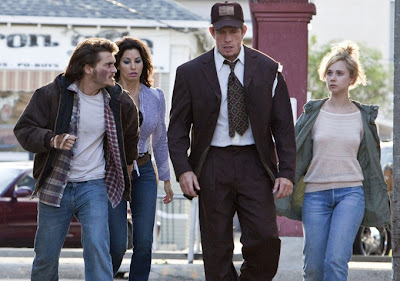"Now You Can Go Get the Marshall"
Quentin Tarantino is a legend of cinema. He burst into the limelight with his freshman film Reservoir Dogs, a low-budget, bloody, violent crime film that established Tarantino not only as a visceral, original filmmaker, but also clearly identified what would be his trademark style - pop culture references, an eclectic, fun soundtrack, long scenes with great dialogue that build suspense in Hitchcockian fashion (you need look no further than the opening scene of Inglourious Basterds for a near-literal Hitchcock bomb-under-the-table suspense mechanism). After the success of Reservoir Dogs, Tarantino was in a tough spot: trying to top that film. Many thought he couldn't do it, but as Tarantino has stated in interviews, he never thought about trying to top his prior work - he just wanted to make movies that he wanted to see. He's said that he's become "tired" of most film, and so what he does is try to make the movies that he wishes were still being made. And, as most people knows, he draws a lot of influence, some subtle, some not so subtle, from other movies; some popular, some very very obscure. And I needn't tell you that his sophomore effort was a huge blockbuster success, and is considered one of the greatest films of all time.
With Django Unchained, Tarantino is going after one of his favorite genres: the spaghetti western. He's previously noted that both Kill Bill and Inglourious Basterds contained elements of the spaghetti western, which they do, but this is Tarantino diving into that genre full-force, except it's set in the southeast United States, before the abolishment of slavery.
I read this script when it first became public, not long after Tarantino finished the script. He also previously released Kill Bill and Inglourious Basterds before their theatrical runs. Certainly didn't hurt their box office.
Tarantino writes some of the most enjoyably readable scripts out there. There may be misspellings and other such errors abound, but who gives a shit? Django Unchained is one hell of a fun read. Not only is the dialogue an absolute delight to read, but Tarantino creates fascinating characters. The first one we meet, in the opening scene, is the very polite, well-spoken, intelligent, and downright dangerous Dr. King Schultz, a German bounty hunter. He's looking for the Brittle brothers to kill them and collect a bounty, and there's one slave who knows what they look like: Django. Schultz comes across a group of slaves on a cold, wintery night (and their slave owners). Django is among these slaves, and he wants to buy Django. But the owners aren't much interested in selling him, so he shoots both of them, and frees Django. And off they go, in search of the Brittle brothers.
I won't reveal any more than that, and any more than the trailers have. In the trailers it's clear that Schultz makes a deal with Django - if he helps him find and kill the Brittle brothers, Schultz will help him find his wife, Broomhilda and rescue her. This is where the primary villain - the most twisted and fierce villain of the script - Calvin Candie (Leonardo DiCaprio) comes into play. Broomhilda is a slave residing on Calvin's "Candieland," a huge plantation in Mississippi. To get Broomhilda, Django and Schultz will have to get themselves invited to Candieland and travel there, under the guise of wanting to buy one of Calvin's "mandigos" (slaves that fight each other). "We've got a fight going on over here that's a good bit of fun," says Calvin.
Interestingly, Calvin Candie doesn't appear until about half-way through the script. Before then, we follow Django and Schultz as they collect on several bounties, find the Brittle brothers, and then Schultz teaches Django the ways of killing white folk. And Django picks up on it pretty damn quickly. Soon enough, he's one badass motherfucker - a free man who knows how to use a gun.
The scenes leading up to the introduction of Candie are amazingly entertaining. Brilliant dialogue that builds suspense around fascinating characters that just leap out of the page. Most curiously, it's also absolutely hilarious. Some of these scenes either had me laughing out loud, or reading with a huge grin on my face (such as the scene with The Sheriff, The Marshall, a piano, and a saloon). Or a scene involving a bunch of pissed off slave owners wearing hoods. This will undoubtedly be Tarantino's funniest film since Pulp Fiction, especially if he continues his trend of subtle, nuanced laughs that aren't on the page (such as in Inglourious Basterds and Kill Bill).
When I saw the first trailer, my immediate thought was: awesome! I had already read the script, and everything about the trailer - some gorgeous shots, seeing some of the dialogue brought to life, and the crazy, bizarre soundtrack that somehow is just absolutely perfect - it all fits the tone and style of the 167 pages of script I read. Carson Reeves reviewed the script recently on his blog, where he gave it a rare "genius" rating. I completely agree with that. In a rather funny touch, Carson noted the genre of the script as "Tarantino." But this is accurate. Like Three Kings, this script is so many different things: an action film, a western, a comedy, among many others.
About the trailers. First, while this is a meager and minor complaint, some scenes look like they aren't set in the southern US. Some scenes look more like Wyoming or Colorado than the Tennessee, Alabama, Mississippi setting that the story takes place in. The Coens recently did something similar by shooting True Grit in New Mexico, which didn't much look like the Arkansas setting it was supposed to be. But, who cares? More importantly, I wish they hadn't revealed the involvement of Samuel L. Jackson. He is absent for the first half of the script, and like Tom Cruise in Tropic Thunder, I think it would have been a pleasant surprise if we hadn't known of his involvement. Especially since he hardly does anything in the trailers. But oh well, it's a marketing ploy (as is the random appearance of Jonah Hill in the latest trailer).
If the final film result is anything like the script and the trailers, this is going to be one of the best films of the year. One of the funniest. One of the most entertaining. And possibly Tarantino's best since Pulp Fiction. We'll just have to see how it all turns out, but everything thus far seems very optimistic.
Cineasts will also not be able to help loving the cameo of Franco Nero (which is also, unfortunately, spoiled in the trailers), who played the original Django.
 |
| Django and Amerigo Vassepi (Franco Nero) |
My only concern about this script is the final act. There is a plot twist (not like a Sixth Sense type twist, but a turning point) that I'm not sure about it. I won't spoil it, but the third act was the least enjoyable part of the script for me, and it's all because of that turning point at the end of the second act. I am highly curious how this will play out on the screen, but even if I end up liking it more than I did on the page, I know there will be (just like Inglourious Basterds) some people who will say the film falls apart in the third act.
If anybody is curious in reading the script and can't find it online, contact me and I'll be happy to send you a PDF. Some people don't like to spoil the experience; I understand that. But as a filmmaker myself, I personally love to experience it on the page and then experience the filmic result. And on the page, this was a delightfully fun read with Tarantino in true form.






















































